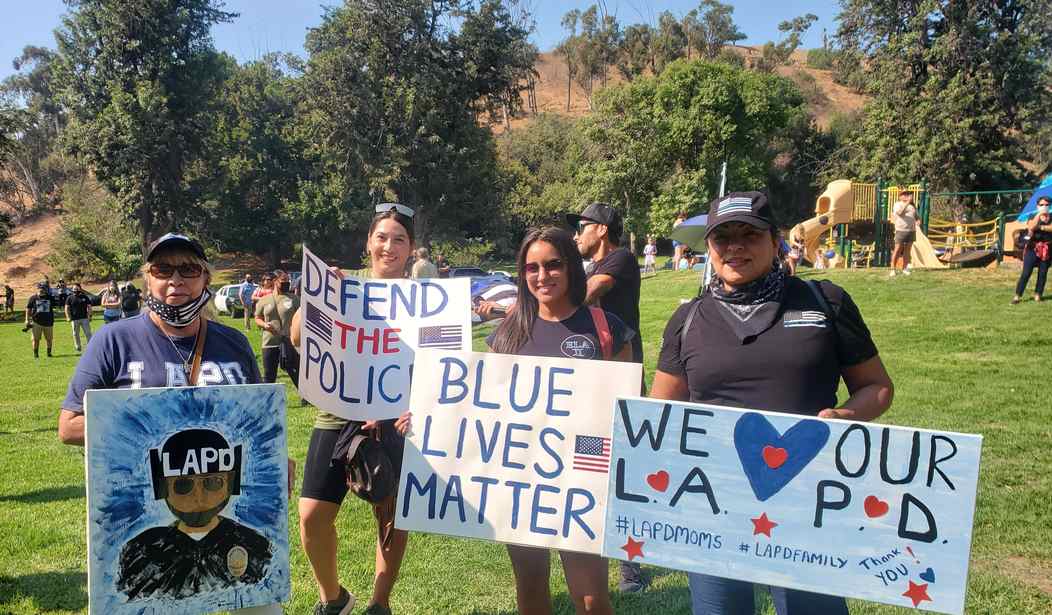We return once again to a never-ending source of material for these columns, that of the Los Angeles Times’s penchant for stories presenting the Los Angeles Police Department in an unfavorable light. The latest example appeared in the prime journalistic real estate above the fold on the front page of Sunday’s print edition, running under the headline, “Cop still on the job despite assault claim.” The sub-headline is no less sensational: “Ex-girlfriend alleges sexual abuse; LAPD corroborates it, then quietly backtracks.”
Available online here (paywalled; I read it so you don’t have to), the story relates the experiences of Kelsie Mathews, 35, whose relationship with LAPD officer Oscar Rojas was evidently tumultuous, to say the least. Mathews, an actress and television production assistant, began dating Rojas in August 2018 and remained in the “toxic” relationship for seven months, a period during which, Mathews alleged, Rojas sexually abused her multiple times, including instances of sodomy.
Let it be acknowledged that if Mathews’s allegations are indeed true, Rojas deserves to be fired from the LAPD and imprisoned. The problem is that we don’t know if the allegations are true, nor does anyone at the Los Angeles Times. In writing the story, Times writer Kevin Rector relied on Mathews’s account of her relationship with Rojas, and on a report from the Los Angeles County district attorney’s office, which itself was based on reports from LAPD internal affairs investigators. The district attorney’s office rejected the investigators’ request to file three counts of sodomy against Rojas, citing inconsistencies in Mathews’s account. In this the D.A.’s office was not showing Rojas special treatment. The rejection is merely an acknowledgement of the difficulty in obtaining a conviction for sex crimes committed in the course of a consensual relationship, especially one that lasted several months.
Nonetheless, the LAPD personnel complaint against Rojas was sustained, i.e., found to be true, and Chief Michel Moore recommended he be terminated. But, under the LAPD’s disciplinary system, the police chief does not have the final word on such matters. Officers facing serious discipline are ordered to a “board of rights,” a quasi-judicial hearing resembling a criminal trial, at which three civilians weigh evidence presented by internal affairs and by an attorney or defense representative for the accused. Only if the board finds the officer guilty as charged can he be disciplined. The decisions emanating from these proceedings, says the Times, “trump those of internal investigators and the police chief and occur under a veil of secrecy that deters independent scrutiny.”
Mathews, writes Rector, was put through a “brutal cross-examination before a panel of three older men,” implying that had the sexes and ages of the panel members been different, the outcome may have been as well. And as for the “brutality” of the cross examination, Rector describes it as such based on Mathews’s account; Rector himself wasn’t present for it as the hearings are not open to the public. Surely the experience wasn’t pleasant for Mathews, but a neutral observer might merely have described the cross examination as effective in casting doubt on her allegations, as the board found Rojas not guilty of the charges.
Mathews tells Rector she wasn’t allowed in the room when Rojas testified, but that when she took the witness stand, Rojas stood behind his defense representative as he “peppered her with questions.” Just as in a criminal trial, witnesses are not allowed to hear the testimony of other witnesses lest their accounts be unduly influenced. Being present in the room with Rojas must have caused anxiety for Mathews, but it is unlikely Rojas stood behind his defense representative as she claims. The hearing rooms are arranged in a manner similar to a courtroom, with the three panel members seated at a table and facing the department advocate, i.e., the prosecutor, to one side and the accused and his representative on the other. Witnesses sit next to the panel, and only the person questioning the witness is allowed to stand, as is the case in a courtroom.
In bemoaning the outcome of Rojas’s board of rights, the Times seems to be lamenting that an accused officer is afforded the fundamental due process rights of presenting a defense and confronting witnesses against him. Would they argue that a criminal jury hear only the prosecution’s evidence before rendering a verdict? An assignment to internal affairs is, sadly, often a path to promotion, and some investigators have been known to be less than scrupulously honest in presenting evidence, especially in cases in which, as with the one against Rojas, the chief of police has made it known he believes the officer to be guilty and wants to see him fired. Would the Times prefer to see these people go unchallenged with an officer’s career on the line?
Rector informs us that Rojas, after his board of rights concluded, returned to work at the LAPD’s Foothill Division but has since been assigned to home pending a new personnel complaint, the nature of which was not disclosed.
I’ve never met Rojas and I know nothing of him other than what was printed in the story. It may be that he’s a bad cop and a bad man, and that the new investigation, unlike the last one, will prove it. But it also may be that Rojas, having escaped the gallows built for him, is now the target of a vendetta and being held to a standard of conduct not universally applied within the LAPD. I wish I could say otherwise, but these things have happened.
The writers and editors at the Los Angeles Times are among the first to howl in protest when an accused criminal’s rights are violated. They may not like it, but accused cops have rights too.









Join the conversation as a VIP Member